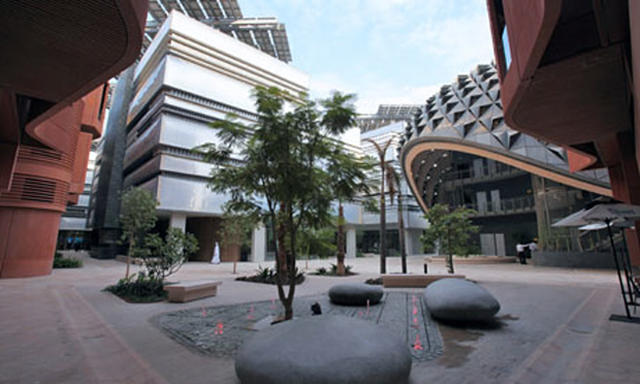Masdar City could become world’s first green ghost town
By Suzanne Goldenberg
16 February 2016 Masdar City (Guardian) – Years from now passing travellers may marvel at the grandeur and the folly of the futuristic landscape on the edges of Abu Dhabi: the barely occupied office blocks, the deserted streets, the vast tracts of undeveloped land and – most of all – the abandoned dream of a zero-carbon city. Masdar City, when it was first conceived a decade ago, was intended to revolutionise thinking about cities and the built environment. Now the world’s first planned sustainable city – the marquee project of the United Arab Emirates’ (UAE) plan to diversify the economy from fossil fuels – could well be the world’s first green ghost town. As of this year – when Masdar was originally scheduled for completion – managers have given up on the original goal of building the world’s first planned zero-carbon city. Masdar City is nowhere close to zeroing out its greenhouse gas emissions now, even at a fraction of its planned footprint. And it will not reach that goal even if the development ever gets fully built, the authorities admitted. “We are not going to try to shoehorn renewable energy into the city just to justify a definition created within a boundary,” said Chris Wan, the design manager for Masdar City. “As of today, it’s not a net zero future,” he said. “It’s about 50%.” […] Mubadala, Abu Dhabi’s state-owned investment company, pledged financial support to the estimated $22bn experiment in urban design. Ten years on, however, only a fraction of the town has been built – less than 5% of the original six square km “greenprint”, as Wan called it. The completion date has been pushed back to 2030. […] And the rationale for Masdar City – demonstrating a model of green living – has been abandoned. “The original aim was to be net zero, yes, but that was when we were looking at the city in isolation,” Wan said. He maintained it was important to look at Masdar City within the context of the other renewable energy holdings of the parent company. Among Mubadala’s other holdings, Masdar Clean Energy is developing the Shams solar farm. “Masdar as a family company is supply[ing] much, much more clean energy than what is being consumed in the city, for sure,” Wan said. “All I am saying is that we are not going to use a city line boundary to try to dictate what is the most cost-effective way to produce clean energy, because the money invested in Masdar City and the money invested in Shams is the same source.” He went on: “In the bigger picture I am doing more good for the country and for planet Earth because it’s much more efficient.” [more]
Masdar’s zero-carbon dream could become world’s first green ghost town
